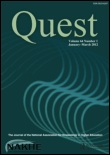
QUEST
Scope & Guideline
Championing excellence in education and sports science research.
Introduction
Aims and Scopes
- Ecological Research and Biodiversity Conservation:
QUEST publishes studies aimed at understanding ecological dynamics, species interactions, and biodiversity conservation strategies, often focusing on specific habitats or species. - Sustainable Environmental Practices:
The journal emphasizes research on sustainable practices in agriculture, aquaculture, and urban planning, promoting methods that reduce environmental impact and enhance ecosystem resilience. - Innovative Methodologies and Technologies:
A significant focus is on the application of advanced technologies such as GIS, remote sensing, and AI in ecological research, offering novel insights and improving data analysis. - Socio-Ecological Systems and Human Impact:
The journal explores the interactions between human activities and ecological systems, assessing socio-economic factors and their implications for environmental sustainability. - Climate Change and Environmental Monitoring:
Research addressing the effects of climate change on ecosystems and strategies for monitoring environmental changes is a core area, reflecting the urgent need to understand and mitigate climate impacts.
Trending and Emerging
- Bibliometric and Meta-Analytical Studies:
An increase in bibliometric analyses indicates a growing interest in assessing research trends and impacts across various ecological topics, providing a comprehensive overview of existing literature. - Artificial Intelligence and Machine Learning in Ecology:
The supporting role of AI and machine learning in ecological monitoring and data analysis is gaining traction, highlighting the integration of technology in environmental research. - Impact of Climate Change on Ecosystems:
Research focusing on the impacts of climate change on various ecosystems is on the rise, indicating an urgent need to understand and address these challenges. - Sustainable Practices in Aquaculture and Agriculture:
There has been a notable increase in studies examining sustainable practices in aquaculture and agriculture, reflecting a growing concern for food security and environmental health. - Community-Based Conservation Approaches:
Emerging themes include community engagement in conservation efforts, highlighting the importance of local knowledge and participation in environmental management.
Declining or Waning
- Historical Ecology Studies:
Research that primarily focuses on historical ecological conditions and changes has become less frequent, possibly due to a growing emphasis on contemporary issues and immediate ecological challenges. - Traditional Agricultural Practices:
While once a significant focus, studies on traditional agricultural methods appear to be declining, as there is a shift towards exploring more innovative and sustainable agricultural practices. - Pollution Studies Outside Aquatic Systems:
Research on pollution in terrestrial ecosystems or non-aquatic environments has decreased, with more attention now being directed toward water quality and aquatic ecosystems. - Localized Case Studies:
There seems to be a decline in case studies focused on specific local environments, as broader, more integrative approaches to environmental issues gain traction.
Similar Journals

GULF AND CARIBBEAN RESEARCH
Innovating Conservation Strategies for Vital Aquatic RegionsGulf and Caribbean Research is an esteemed academic journal published by the University of Southern Mississippi, dedicated to advancing the understanding of aquatic ecosystems in the Gulf of Mexico and the Caribbean region. With an ISSN of 1528-0470 and an E-ISSN of 2572-1410, the journal serves as an essential platform for researchers and professionals in the fields of Aquatic Science, Oceanography, and Water Science and Technology, recognized in the 2023 Q3 Quartile rankings across these disciplines. The journal welcomes diverse contributions including original research, reviews, and technical notes, encouraging interdisciplinary approaches to address ecological and environmental challenges within its scope. Despite the absence of an open access option, it provides invaluable insights, evidenced by its Scopus rankings, which position it within the 31st to 33rd percentile across various related categories. The engaging research articulated in Gulf and Caribbean Research fosters dialogue and collaboration, making it a vital resource for those committed to scientific discovery and conservation efforts in these critical aquatic environments.

Neotropical Biodiversity
Empowering scientists to understand and preserve Neotropical life.Neotropical Biodiversity is a prominent journal dedicated to advancing our understanding of biodiversity and ecological dynamics within the Neotropical region. Published by TAYLOR & FRANCIS LTD in the United Kingdom, this Open Access journal has been providing unrestricted access to research findings since 2015, fostering collaboration and knowledge sharing among the global scientific community. With an emphasis on innovative research in Ecology, Ecology, Evolution, Behavior and Systematics, and Global and Planetary Change, it has earned a reputation for excellence, currently holding a Q3 category in its field. As of 2023, the journal ranks in the 37th percentile for Environmental Science (Ecology) and in the 36th percentile for Agricultural and Biological Sciences (Ecology, Evolution, Behavior and Systematics), making it a valuable resource for researchers, professionals, and students interested in understanding and preserving biodiversity in one of the world's most diverse ecosystems. We invite you to explore the cutting-edge research published in Neotropical Biodiversity and contribute to the ongoing dialogue for environmental sustainability and ecological resilience.

Nature Conservation Research
Advancing conservation science for a sustainable future.Nature Conservation Research is a prominent open-access journal that has been dedicated to advancing the field of conservation science since its inception in 2016. Published by the SARANSK FOND PODDERZKI & RAZVITIA ZAPOVEDNYH in the Russian Federation, this journal serves as a vital platform for researchers, professionals, and students alike, providing critical insights into ecological and environmental issues. With an impressive impact factor and ranked in the second quartile across multiple categories—including Agricultural and Biological Sciences, Earth and Planetary Sciences, Ecology, and Nature and Landscape Conservation—Nature Conservation Research stands at the forefront of impactful scientific discourse. The journal not only aims to disseminate high-quality research findings but also seeks to foster collaboration and innovation in conservation practices globally. By ensuring open access to its content, it promotes widespread dissemination of knowledge, crucial in the fight against biodiversity loss and environmental degradation. Researchers and practitioners contributing to the journal will find themselves at the convergence of science and conservation efforts, paving the way for sustainable ecosystem management.

SYSTEM
Uncovering critical issues in language education and applied linguistics.SYSTEM is a premier scholarly journal dedicated to the fields of Education and Linguistics, published by Elsevier Science Ltd. With a notable impact factor and recognition as a Q1 journal in both Education and Linguistics for 2023, SYSTEM stands out among its peers, ranking at the 12th and 13th position in the respective Scopus categories, placing it in the top 2% of its field. Since its inception in 1973, the journal has provided a platform for innovative research that explores critical issues in language education, applied linguistics, and the intersection of technology and learning. While this journal does not offer open access, it remains highly regarded for its rigorous peer-review process and commitment to advancing knowledge. Researchers, professionals, and students alike will find SYSTEM an invaluable resource for cutting-edge studies and insights that drive the academic discourse in language and education.
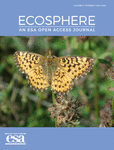
Ecosphere
Elevating the discourse in ecology and evolution.Ecosphere is a leading open-access journal published by WILEY, dedicated to advancing research in the fields of ecology, evolution, behavior, and systematics. Established in 2010 and headquartered in the United States, this innovative journal provides a platform for the exchange of cutting-edge scientific knowledge and discovery, fulfilling its mission to enhance our understanding of ecological systems and their interactions. With a prestigious impact factor reflecting its commitment to high-quality research, Ecosphere is ranked Q1 in both Ecology and Ecology, Evolution, Behavior, and Systematics for 2023, further solidifying its prominence in the scientific community. The journal's scope includes a wide array of topics related to environmental science, making it an essential resource for researchers, professionals, and students aiming to stay at the forefront of ecological research. It offers comprehensive open access options, ensuring that groundbreaking findings are readily available to a global audience, thus fostering collaboration and innovation in the field.
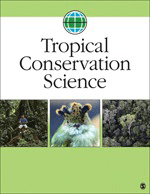
Tropical Conservation Science
Connecting researchers to inspire ecological stewardship.Tropical Conservation Science, an esteemed journal published by SAGE Publications Inc, plays a pivotal role in the field of environmental science, particularly within the realms of ecology and nature conservation. Established as an Open Access platform since 2008, it facilitates global dissemination of critical research findings dedicated to the preservation of tropical ecosystems. With an impressive impact factor reflected in its Q2 rankings within both ecology and nature landscape conservation categories for 2023, the journal is ranked in the 66th percentile for Environmental Science and maintains a strong position in the academic community. The journal’s scope encompasses a wide array of tropical conservation issues and aims to foster interdisciplinary collaboration among researchers, professionals, and students committed to advancing conservation strategies. Tropical Conservation Science is not merely a publication; it's a vital resource contributing to the safeguarding of our planet's biodiversity.
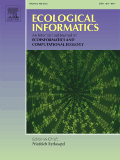
Ecological Informatics
Exploring innovative methodologies in ecological research.Ecological Informatics is a premier journal published by Elsevier, dedicated to advancing the interdisciplinary fields of ecology and informatics since its inception in 2006. With its ISSN 1574-9541 and E-ISSN 1878-0512, this Netherlands-based journal has established itself as a leading platform for high-quality research, reflected in its impressive Q1 rankings across multiple categories including Applied Mathematics, Computational Theory, Ecology, and Ecological Modeling, showcasing its critical role in shaping scientific discourse in these important domains. The journal ranks in the top percentiles for various fields: for instance, it stands at rank #26/635 in Applied Mathematics and #8/41 in Ecological Modeling according to Scopus. Though it currently does not offer open access options, its commitment to publishing impactful studies underscores its significance to researchers, professionals, and students interested in ecological and computational methodologies. Researchers in these fields are encouraged to explore and contribute to this respected journal as it continues to inspire innovative solutions for ecological challenges.
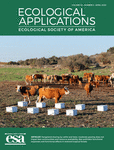
ECOLOGICAL APPLICATIONS
Connecting research to conservation for impactful change.ECOLOGICAL APPLICATIONS, published by WILEY, is a leading journal in the field of ecology, providing a platform for innovative research that addresses the understanding and management of ecological systems. With an ISSN of 1051-0761 and E-ISSN of 1939-5582, it has established itself as a vital resource for ecologists and environmental scientists since its inception in 1991. Ranked in the top quartile (Q1) for Ecology in 2023 and with a Scopus ranking of 40 out of 461 in Environmental Science, ECOLOGICAL APPLICATIONS boasts an impressive impact factor, attesting to its significance and influence in the field. The journal's mission is to publish peer-reviewed articles that contribute to ecological theory and its applications in conservation and environmental management. Researchers, professionals, and students alike will find invaluable insights and the latest developments in ecological research through its comprehensive scope and rigorous scholarship, ensuring a crucial role in shaping future ecological practices and policies.

FOREST SCIENCE
Advancing knowledge in forestry and ecology.FOREST SCIENCE, published by Oxford University Press Inc, is a pivotal journal in the field of forestry and ecological modeling, boasting an impressive track record since its inception in 1970. With an ISSN of 0015-749X and E-ISSN 1938-3738, the journal provides a valuable platform for the dissemination of high-quality research and studies that address contemporary challenges in forestry and ecology. It ranks in the Q2 category for both ecology and forestry and holds a Q3 ranking in ecological modeling according to the latest evaluations, illustrating its significant contribution to these fields. The journal is accessible through various options, facilitating broad readership and engagement within the academic community. As part of its commitment to advancing knowledge and practices in forest management and conservation, FOREST SCIENCE seeks to bridge theoretical research with practical applications, making it an indispensable resource for researchers, professionals, and students alike.

FOLIA GEOBOTANICA
Exploring the intricate connections between flora and fossil.FOLIA GEOBOTANICA, published by Springer, is a distinguished journal dedicated to advancing the fields of Paleontology and Plant Science through the dissemination of high-quality research. With an ISSN of 1211-9520 and an E-ISSN of 1874-9348, this journal has been pivotal in providing a platform for innovative studies from 1994 to 2024. Notably, FOLIA GEOBOTANICA holds a Q3 ranking in Paleontology and a Q2 ranking in Plant Science as of 2023, affirming its relevance and contribution to the scholarly community. The journal is located in the Netherlands at VAN GODEWIJCKSTRAAT 30, 3311 GZ DORDRECHT, and is not an Open Access publication, ensuring comprehensive review processes and scholarly integrity. With Scopus rankings that place it in the 50th percentile for Plant Science and 46th for Paleontology, FOLIA GEOBOTANICA continues to attract researchers, professionals, and students who are keen to explore the intricacies of plant ecology and fossil records, thereby fostering a deeper understanding of ecological and evolutionary patterns.